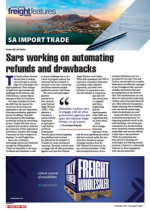In the final quarter of 2023, a decrease in import volumes is anticipated due to diminishing demand for goods. This decline in consumer spending comes as rising living costs inf luence the economy.Kreeson Moodley, trade lane manager at SACO CFR, said the reduction in import volumes was evidence that consumers were tightening their purse strings amid cost-of-living increases, which included rising prices for essential goods and services. "Economic uncertainty, high percentages of inf lation and increased costs are placing a strain on people’s livelihoods, which is resulting in reduced consumer spend and lower demand for products."And as consumer spending dwindles, businesses are adapting their import strategies. Many are diligently managing their current inventory, prioritising the reduction of existing stock levels before considering restocking."As a groupage operator trying to navigate a dynamic market, it is imperative to adapt quickly and continue providing quality products to our customers," said Moodley, indicating that SACO CFR was constantly improving existing services to meet customer needs. "For example, when Cape Town was cancelled as a port call on shipping lines’ southbound voyages from Europe, there was a tremendous increase in transit times experienced. To combat this challenge, an alternative solution had to be found, and MACS Shipping offered a schedule that met the requirement for improved transit times. As of May this year, we now perform our LCL service from Hamburg to Cape Town with MACS on every single departure as an additional service offering to our customers."Cost-effective solutionsAnother imperative is meeting the growing demand for cost-effective solutions. "We have launched a service and introduced weekly departures from Fos-sur-Mer, France, to Durban. This service benefits customers in the south of France with reduced trucking charges and transit times, as customers no longer have to deliver their cargo into Le Havre, situated in the north of the country," said Moodley.He added that, imports from Europe to South Africa were increasing. "In Europe, the extensive summer break, from late June to the end of September, creates conspicuous gaps in EU exports. Northern Europe observes its summer holiday break from the end of June through the beginning of August, while Southern Europe's holiday season extends from the end of July to September. Although this cyclical summer occurrence is expected, we acknowledge the necessity of adapting to evolving trends. As a result, October volumes have returned to a standard level seen before the EU summer break. It's noteworthy that, regardless of the volume, we always maintained our weekly direct sa i l i ng s."Rates continue to softenMoodley told Freight Newsthat carrier freight rates were continuing to soften due to increased carrier capacity and reduced demand. "This poses a particular challenge for groupage operators as customers prefer to load full container loads due to the reduced freight pricing made available to them," he said. "South African port congestion and berthing delays significantly impact carriers' sailing schedules and published transit times. This results in extended lead times for cargo movement, negatively impacting customers with time-sensitive cargo and those who need to manage their inventory. Our strategy around this is to load as many direct services as possible."He said cost was also impacted by the ongoing demand to reduce carbon emissions. "This means cleaner fuels need to be purchased at an increased cost. "In 2024, an ETS (EU Emissions Trading System) surcharge will be implemented by carriers to reduce carbon emissions, which will be an additional cost that customers will have to pay," said Moodley.Another growing challenge is the acceptance of hazardous goods, as carriers are now enforcing strict rules for dangerous goods commodities. "If cargo is not declared accurately, carriers may impose substantial fines. This is a market condition affecting all involved parties, and the top priority is to comply with carrier requirements to avoid the rejection of hazardous cargo at the booking stage."

